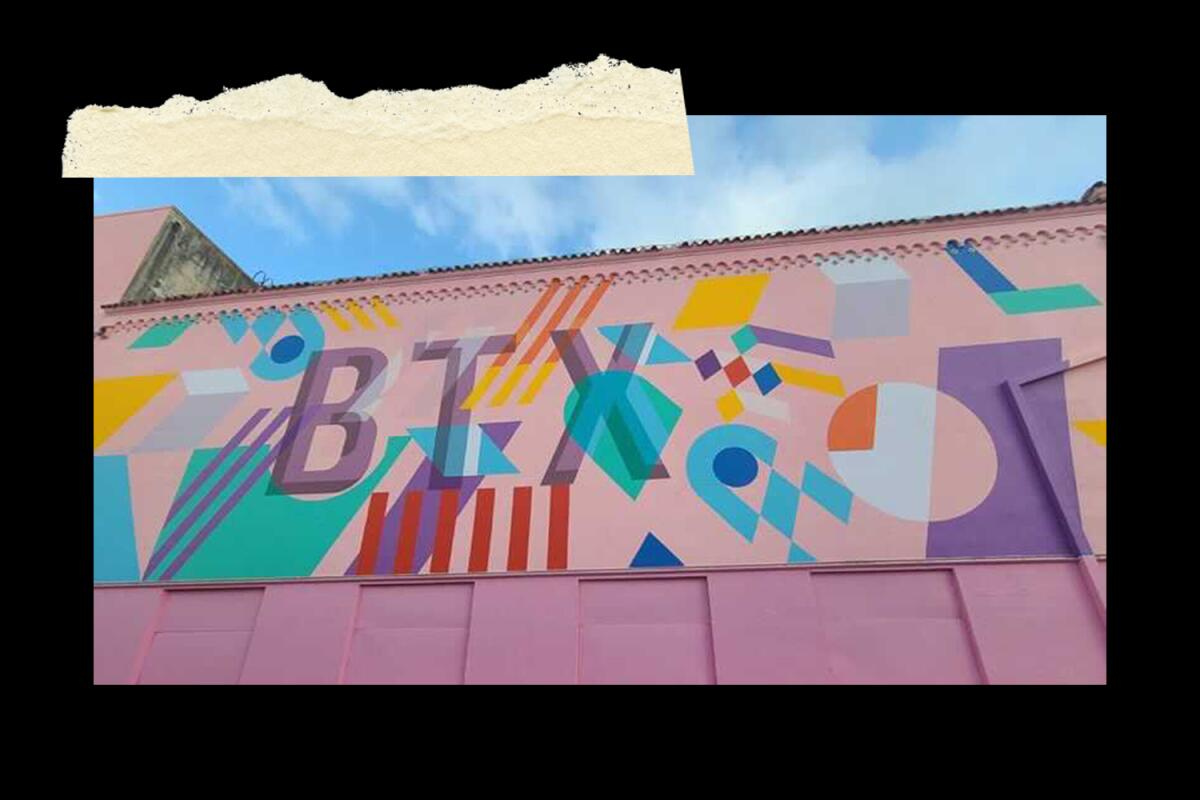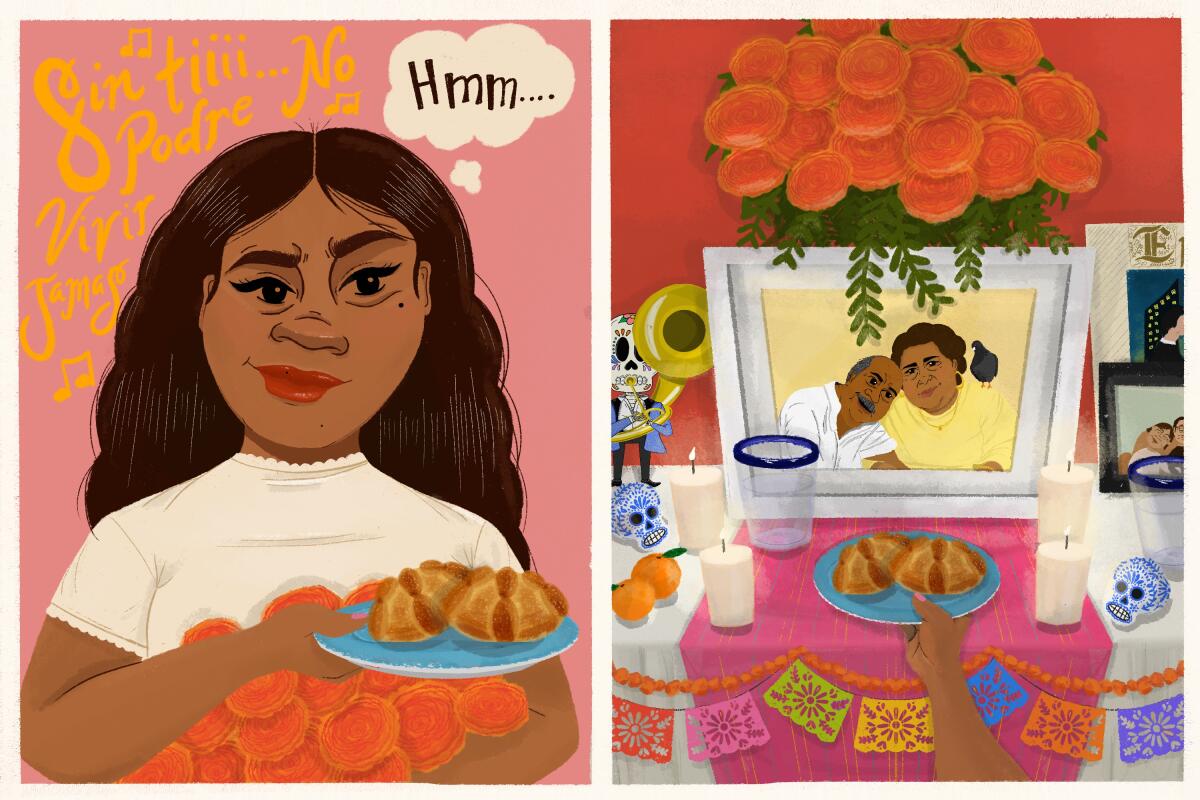Latinx Files: Another kind of border wall

In last week’s newsletter, I wrote about how murals can be an opportunity to tell stories about a community.
Of course, it also matters who is doing the telling and what it is they’re saying.
In early September, the border city of Brownsville (Puro 956, cuh!) announced a plan to revitalize the downtown business district through a series of commissioned murals, all “part of an effort to recover spaces for artistic expansion in the center of the city,” according to a news release. The first of these works of public art would be painted on the side of the historic Capitol Theatre by Los Angeles-based artist Teddy Kelly.
“I would venture to say it’s going to be one of the largest murals in the [Rio Grande Valley], if not the biggest,” Ramiro Gonzalez, Brownsville’s then-director of community and government affairs (he is no longer employed by the city) told Valley Central News at the time.
It may be the largest mural in the RGV, but to some Brownsville residents it feels like a mischaracterization of their hometown.
“If you’re not from here and you go see it, you’re going to think that it represents Brownsville and you’ll be mistaken in what the culture is here,” said Gabriel Treviño, a local artist with more than 20 years of experience.
“We’re sending the wrong message, and it’s creating the wrong image that has nothing to do with the local culture.”
Treviño isn’t wrong. Kelly’s 6,000-square-foot mural is replete with geometric shapes and pastel colors. It’s the perfect background for Instagram selfies, sure, but the only sign that you’re in Brownsville is the block letters “BTX,” shorthand for Brownsville, Texas, no doubt an aspirational nod to “ATX,” or Austin.
Some took umbrage with the selection of a California artist instead of someone local. The mural revitalization project was funded by the Musk Foundation, tech billionaire Elon Musk’s charity organization. For his work, Kelly was paid $20,000, more than half of Brownsville’s 2019 median household income of $38,588.
“That money was supposed to benefit our community,” said Melissa Mendoza, another local artist and vocal critic of the mural project. “How is it benefiting us if that money gets on a plane and heads back to California to stimulate their local economy?
“I’m sure local artists would have been able to use that money; they would have been able to use that money to go to [Mayor Juan ‘Trey’ Mendez’s] pizza place downtown. He’s always telling us to keep everything local, to support local businesses, but then they themselves don’t even support the local artists. It’s sad.”
Mendoza wasn’t always a critic of Mendez, saying she campaigned for him because she saw “a young, motivated, handsome Chicano lawyer whose job it was to stand up to the powerful people.”
Now, she feels the mural is “a slap in the face.” It also feels like a sign of what’s to come.
The Latinx experience chronicled
Get the Latinx Files newsletter for stories that capture the multitudes within our communities.
You may occasionally receive promotional content from the Los Angeles Times.
The SpaceX launch site in Boca Chica Beach is about 25 miles northeast of the Capitol Theatre mural. Dubbed “Starbase, Texas” by Musk, the location appears to play a central role in the billionaire’s quest to colonize Mars.
“Please consider moving to Starbase or greater Brownsville/South Padre area in Texas & encourage friends to do so,” Musk tweeted in March, the same day a prototype rocket exploded as it was trying to land. “SpaceX’s hiring needs for engineers, technicians, builders & essential support personnel of all kinds are growing rapidly.”
Which brings us back to the mural project. Yes, downtown Brownsville is in the midst of a revitalization, but whom is it for?
“What is happening in Brownsville is exactly what has happened in larger municipalities 10 years ago, which is that art is being instrumentalized as a way to create capital incentives,” said ChristinaMaria Xochitlzihuatl Patiño Houle, co-founder of the south Texas arts collective Las Imaginistas, noting the longtime relationship that exists between capital and art, citing the patronage of Renaissance artists by the rich and powerful.
“It’s instrumentalized beautification for the sake of mobilizing gentrification.”
For his part, Mayor Mendez has defended the mural, acknowledging in an Instagram post that not everyone would like it.
Felipe Romero, communications and marketing director for the city, also sent the following statement to The Times:
“The city continues to support Brownsville’s dynamic art and culture scene, with projects like the Brownsville Mural Program, Calle Calaveras, and Lazos de mi Ciudad. The Brownsville Mural Program has grown to be a collaborative effort to blend diverse talents from around the world. With several art projects on the horizon, the city is staying committed to providing opportunities for artists through community engagement.”
On Tuesday, local blog El Rrun Rrun reported that the second mural for the revitalization project was nearly completed, this time created by Mexican artist Sofia Castaneda.
The Times reached out to the Musk Foundation via telephone and email but has not received a response.
For more on the effects that SpaceX’s launch site is having on Boca Chica Beach, dubbed “the poor people’s beach,” I recommend this Texas Observer story by Gus Bova, as well as this New York Times report.
Our daily news podcast
If you’re a fan of this newsletter, you’ll probably love our new daily podcast, “The Times,” hosted by columnist Gustavo Arellano, along with reporters from across our newsroom. Every weekday, it takes you beyond the headlines. Subscribe on Apple Podcasts and follow on Spotify.
A quick correction
Last week’s edition of the newsletter said a new South El Monte Art Posse mural featured writer Carribean Fragoza. Fragoza is not included in the piece.
Closing the Latina wage gap
Today is Latina Equal Pay Day, the date that signifies how much longer Latinas have to work to catch up to the 2020 wages of their white, non-Latinx male counterparts.
The wage gap is larger for Latinas — they earn 57 cents for every dollar a white, non-Latinx man makes — than it is for women belonging to other racial and/or ethnic groups. According to Equal Pay Today, Asian American and Pacific Islander women earn 80 cents on the dollar, Black women earn 63 cents on the dollar, and Native women earn 60 cents on the dollar.
But wait, it gets worse. According to a 2020 report from the National Women’s Law Center, the wage gap will cost Latinas more than $1 million over the course of a 40-year career.
“The pay gap impacts our ability to have what we need to live our lives with security,” Mónica Ramírez, co-founder of organizations Alianza Nacional de Campesinas and the Latinx House, wrote in an op-ed published in Latina.
“It impacts our ability to pay for our children to go to college, to save for the future, and to have confidence that we will have the financial footing to retire one day.”
These daunting figures have real-life consequences, and if the claim is that the future is Latina — which I believe in — then closing the wage gap is imperative if we want it to be less dystopian.
How do we fix this? I don’t know, but I am a big supporter of salary transparency.
“From a worker’s perspective, without accurate information about peer compensation, they may not know when they’re being underpaid,” UCLA economist Emiliano Huet-Vaughn told the New York Times in 2019, noting that “it naturally becomes harder to make the case that one is suffering a form of pay discrimination” if you don’t know what your co-workers are earning.
For more on the pay gap, I recommend this episode from Radar 2021, Telemundo’s English-language digital news program.
Consider subscribing to the Los Angeles Times
Your support helps us deliver the news that matters most. Become a subscriber.
Things we read and saw this week that you should check out
— Last Friday, thousands of Puerto Ricans took to the street to protest LUMA Energy, a power company that took over the management of Puerto Rico’s electrical grid after it was privatized. As Paola Rosa-Aquino of New York Magazine reports, Puerto Ricans have seen their electric bills — already among the highest in the United States — skyrocket and have been subjected to so many rolling blackouts the government declared a state of emergency. According to the Guardian, Puerto Rico’s unreliable and battered grid has led many to turn to solar power.
— My colleague Suzy Exposito has this commentary on J Balvin and Tokischka’s music video for “Perra,” which has been heavily criticized for its displays of misogynoir and was quietly removed from YouTube.
— From the Nevada Independent, a mariachi music program is growing in schools across Clark County.
— There has been no meaningful immigration reform nine months after President Biden promised to “aggressively advocate for legislation that creates a clear road map to legal status and citizenship” for 11 million. In her latest, Times columnist Jean Guerrero asks who is going to step up to be the champion of immigrants in the post-Trump era.
— The best thing on the Latinernet: Whoever got the brilliant idea of mashing up promotional footage of the upcoming “Dune” movie with Vicente Fernandez’s “Para Siempre,” please reveal yourselves! I’m not kidding when I say it took me a second to realize that this video wasn’t the intro to an upcoming Televisa telenovela. It’s the “Timoteo Chávez” and “Zendaya Colmenar” that does it for me.
And now for something a little different...

Valeria Olguín is a Xicana visual artist and community organizer raised between South San Francisco and her mom’s burrito shop. She refers to her work as lighthearted love letters, using it to connect with others with similar experiences and identities through shared joy.
This comic was inspired by the love for our ancestors that transcends death. Although they’re no longer present, we continue loving and respecting our loved ones. The detail, intention and focus we put into our ofrendas is a translation of the love and respect we will always hold for them, no matter how much time has passed.
Are you a Latinx artist? We want your help telling our stories. Send us your pitches for illustrations, comics, GIFs and more! Email our art director at [email protected].
The Latinx experience chronicled
Get the Latinx Files newsletter for stories that capture the multitudes within our communities.
You may occasionally receive promotional content from the Los Angeles Times.




